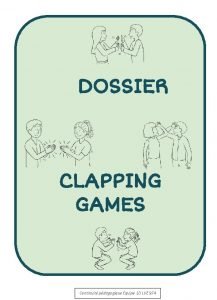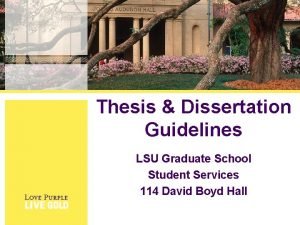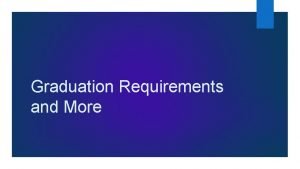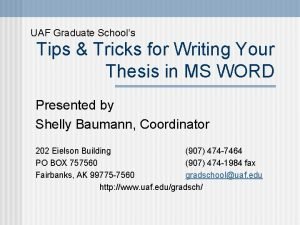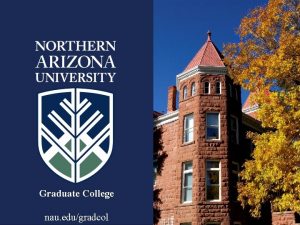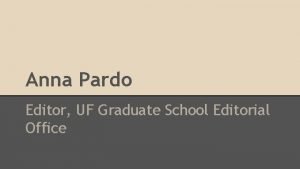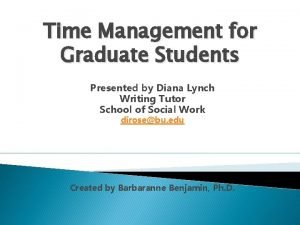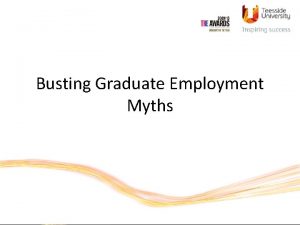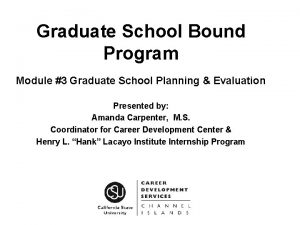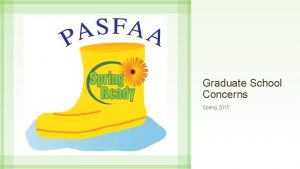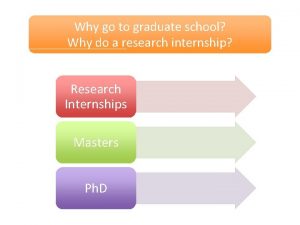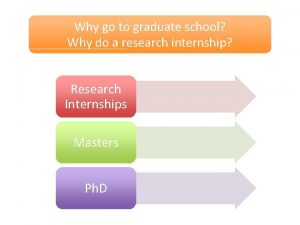Going To Graduate School Why graduate school What

















- Slides: 17

Going To Graduate School

Why graduate school? What are your career objectives? Do you enjoy the academic environment and want to continue your education? Do you want to face more challenges and have more responsibility in your career? Do you have a thirst for knowledge and scientific discovery? Do you want to teach? More job opportunities? Enhanced financial incentives? M. S. degree students can start at $55 -75, 000/year, Ph. D at $65105, 000/year.

Preparing for Graduate School Consider taking 400 or even 500 level courses. Undergraduate research experience CRSC 295, 396; PLPA 395; HORT 295, 396. Apply for on or off-campus internships CRSC and HORT 293 and 294. Apply for summer jobs in your field of interest. Undergraduate research experience or summer jobs in Crop Science or Horticulture programs either in academia, industry, or with the government are a big plus in getting accepted to graduate schools.

The Graduate Record Examination Graduate programs use GRE scores to evaluate your readiness for graduate-level work. The GRE General Test measures verbal reasoning, quantitative reasoning, critical thinking and analytical writing skills that are not related to any specific field of study. Analytical Writing — Measures critical thinking and analytical writing skills, specifically the test taker's ability to articulate complex ideas clearly and effectively Verbal Reasoning — Measures reading comprehension skills and verbal and analogical reasoning skills, focusing on the test taker's ability to analyze and evaluate written material Quantitative Reasoning — Measures problem-solving ability, focusing on basic concepts of arithmetic, algebra, geometry and data analysis

Where to apply? 1. Review academic rankings and quality of schools. 2. Talk to faculty, current graduate students, family or friends about good schools. 3. Visit College Web sites. 4. Identify interesting faculty/programs. 5. Email graduate coordinators or potential faculty advisors. 6. Identify several schools to apply to. 7. Apply for National or regional competitive fellowships.

When to apply? Most schools accept applications between late November to early April for admission in the following fall semester. Complete your application early – by January or February because most schools award fellowship to applicants by February or March. Some schools will allow students to start in the summer or in the Spring semester.

Application to the Department of Crop Sciences Go online to: http: //cropsci. illinois. edu/graduate. Which will describe application requirements and what must be submitted with your application. This web site provides a link to the U. of I. Graduate College admissions, which will walk you through the process. This web site will also provide the list of faculty in the Department, a description of their programs, and email contact information.

Graduate Programs in Crop Sciences On-campus M. S. program (thesis required). On-line M. S. program (thesis not required; terminal degree). On-campus Bioinformatics M. S. program (thesis). On-campus B. S. direct to Ph. D. program (thesis required). Only exceptionally strong applicants are admitted to this program. On-campus Ph. D. program. Applicants have or are about to complete a M. S. in an appropriate discipline.

Crop Science Program Areas and student numbers • • Plant Breeding and Genetics Plant Path. , Weed Science, Nematology, & Entomology Crop Production Horticulture/Urban Ag. /Sustainable landscapes Bioinformatics/Biometrics Crop Ecol. /Envir. & Soil Sci. Molecular Biology - 40 - 22 - 14 - 11 - 10 - 7

FY 2012 -2013 Graduate Student Stipends 50% Appointments $/Mo $/Sem $/9 Mo $/12 Mo M. S. Students $1, 746 $7, 856 $15, 713 $21, 474 Ph. D. Students $1, 890 $8, 505 $17, 010 $23, 253 Fellowship Students – M. S. – Ph. D. $22, 974 $24, 753

What are the eligibility requirements? You must have maintained a GPA of 3. 0 or greater during the last 60 hours of your undergraduate program. You will need to show that you will have completed your B. S. (occasionally a B. A. ) at an accredited college prior to enrollment. Completion of the GRE with recommended scores over 1100 on the verbal + quantitative and 3. 0 or greater on the analytical.

What to submit with your application Complete and submit the online application form. Personal statement describing your experience, disciplinary interest, and potential faculty advisors. What can you bring to the table? Resume Transcripts from each of the colleges you attended during your undergraduate program. Arrange for submission of three letters of reference. References from academic faculty or previous job supervisors are best. Contact Dianne Carson (sdcarson@illinois. edu) or Jack Juvik (juvik@illinois. edu) for more information.

Funding In the Department of Crop Sciences no applicant is accepted unless a faculty member is willing to serve as their advisor AND will commit to provide support for a 50% RA for the duration of the student’s program (assuming satisfactory progress). This support can be in the form of a research assistantship, a teaching assistantship or a combination of both. If a faculty member agrees to this then the applicant becomes eligible for consideration for a fellowship. Along with the 50% appointment is a tuition and fee waiver (except for about $550/semester)

Fellowship Opportunities Crop Sciences currently supports over 30 students on departmental and College or ACES fellowships. Fellowship eligibility requirements include a GPA of 3. 5 or greater, strong basic science background, averaged GRE scores in the upper 50 percentile, strong letters of recommendation, appropriate undergraduate research job, or internship experience, and well articulated personal statement. Completed application packets must be received by February 1 for fall enrollment. Most of the fellowships are awarded to fall applicants.

Crop Sciences Fellowships Named Fellowships: Ewing, Ainsworth, Lange and Aldrich, Ambrose, Brockson, Calkin, Hackleman, Hageman, Ingersoll, J. B. Turner, Schrader, Slife, Ball, Boerner, etc. annually provide about $240, 000 to 16 -18 graduate students. Illinois Plant Breeding Center Fellowships and Scholarships sponsored by Monsanto, Pioneer, Illinois Corn Growers Association, and Dow Agro. Sciences provide full fellowships to approximately 18 plant breeding graduate students.

After submitting application Notify potential faculty advisors that you have applied. Arrange to visit the schools of interest. Some departments at some schools will invite you to visit and may provide some travel support. If you receive an admission offer make sure how much support will be provided for how long. Offers of fellowships can allow you more choice about your graduate program. These are good on your resume and can provide somewhat higher stipends.

Questions?
 Lve
Lve Andreas carlsson bye bye bye
Andreas carlsson bye bye bye If you are going through hell, keep going
If you are going through hell, keep going Don't ask why why why
Don't ask why why why Lsu dissertation guidelines
Lsu dissertation guidelines Upm sgs
Upm sgs Graduate school korea university
Graduate school korea university High school honor graduate requirements georgia
High school honor graduate requirements georgia Himalayan graduate school of theology
Himalayan graduate school of theology Uaf microsoft office
Uaf microsoft office Usf graduate school
Usf graduate school Nau graduate college
Nau graduate college Ucla graduate school
Ucla graduate school Uf editorial office
Uf editorial office Ajou university graduate school of international studies
Ajou university graduate school of international studies Oussep osaka
Oussep osaka Time management in graduate school
Time management in graduate school Keller graduate school of mgmt
Keller graduate school of mgmt
